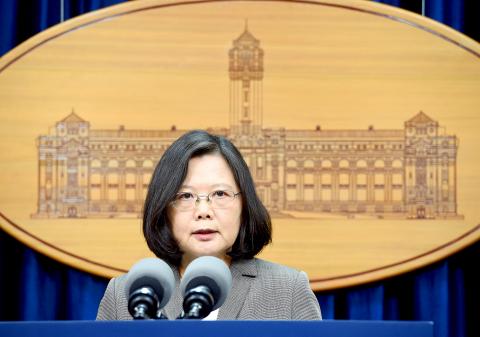President Tsai Ing-wen (蔡英文) yesterday said that Taiwan would not give in to threats from China, after Panama announced earlier in the day that it was switching diplomatic recognition from Taipei to Beijing.
Despite Beijing’s constant suppression of Taiwan’s international space, the Republic of China (ROC) remains a sovereign nation and that is a fact Beijing cannot deny, Tsai said at a news conference after the announcement.
In addition, the ROC’s existence and its value and status in the international community cannot be changed, she said.

Photo: Peter Lo, Taipei Times
“Our approach of not competing with Beijing’s ‘checkbook diplomacy’ will not change,” she added.
On behalf of Taiwan’s 23 million people, “we will not compromise under its threat,” she said.
“Our only choice is to work together against the threat,” which is the most powerful way to highlight Taiwan’s sovereignty, Tsai said, adding that Taiwan’s existence and its presence in the international arena are vital to regional peace and stability.
“We would not be happy to see cross-strait relations go from peaceful to confrontational because of Beijing’s mistaken thinking and provocations,” she said.
The president said her message to Beijing is that Taiwan has fulfilled its responsibility to maintain cross-strait peace and stability, but Beijing’s actions have affected the stable cross-strait “status quo,” which is unacceptable to Taiwanese.
National security authorities had been keeping abreast of the situation as it developed and had done their best, but Panama’s final decision was regrettable, she said.
The government would now work to ensure that national economic plans would not be affected and would continue to protect the rights of Taiwanese businesspeople and other Taiwanese in the Central American nation, she said.
At a separate news conference, Presidential Office Secretary-
General Joseph Wu (吳釗燮) described Beijing’s action as a “mistake” that would hurt the cross-strait “status quo” and push cross-strait ties from peace toward confrontation, adding that the government would re-evaluate the cross-strait situation.
He also urged Beijing to desist from any moves that could damage regional stability and hurt Taiwanese, and appealed to Taiwanese to stand united in the face of external challenges.
“Such action is not only a blatant threat to Taiwanese’s right to survive, but also a blatant provocation to cross-strait and regional peace and stability,” he said. “We hereby express our serious condemnation.”
Mainland Affairs Council Deputy Minister Chiu Chui-cheng (邱垂正) told a separate news conference that the government would not rule out reviewing related policies, including those on cross-strait ties and taking “necessary measures.”
He said that over the past year, the government has committed itself to maintaining cross-strait peace and stability by exercising restraint and showing good will.
However, Beijing has repeatedly hurt the feelings of Taiwanese and created confrontation and conflict across the Taiwan Strait, he said, adding that Chinese authorities must “take full responsibility” for damaging cross-strait peace and stability.
Premier Lin Chuan (林全) also expressed regret over Panama’s decision to break diplomatic ties with Taiwan and establish formal relations with China.
“I do not think it is effective if China believes it can achieve its ‘one China’ principle by poaching Taiwan’s diplomatic allies. In fact, it could backfire and cause cross-strait relations to deteriorate,” Lin said.
Additional reporting by Chen Wei-han

CHAOS: Iranians took to the streets playing celebratory music after reports of Khamenei’s death on Saturday, while mourners also gathered in Tehran yesterday Iranian Supreme Leader Ayatollah Ali Khamenei was killed in a major attack on Iran launched by Israel and the US, throwing the future of the Islamic republic into doubt and raising the risk of regional instability. Iranian state television and the state-run IRNA news agency announced the 86-year-old’s death early yesterday. US President Donald Trump said it gave Iranians their “greatest chance” to “take back” their country. The announcements came after a joint US and Israeli aerial bombardment that targeted Iranian military and governmental sites. Trump said the “heavy and pinpoint bombing” would continue through the week or as long

TRUST: The KMT said it respected the US’ timing and considerations, and hoped it would continue to honor its commitments to helping Taiwan bolster its defenses and deterrence US President Donald Trump is delaying a multibillion-dollar arms sale to Taiwan to ensure his visit to Beijing is successful, a New York Times report said. The weapons sales package has stalled in the US Department of State, the report said, citing US officials it did not identify. The White House has told agencies not to push forward ahead of Trump’s meeting with Chinese President Xi Jinping (習近平), it said. The two last month held a phone call to discuss trade and geopolitical flashpoints ahead of the summit. Xi raised the Taiwan issue and urged the US to handle arms sales to

State-run CPC Corp, Taiwan (CPC, 台灣中油) yesterday said that it had confirmed on Saturday night with its liquefied natural gas (LNG) and crude oil suppliers that shipments are proceeding as scheduled and that domestic supplies remain unaffected. The CPC yesterday announced the gasoline and diesel prices will rise by NT$0.2 and NT$0.4 per liter, respectively, starting Monday, citing Middle East tensions and blizzards in the eastern United States. CPC also iterated it has been reducing the proportion of crude oil imports from the Middle East and diversifying its supply sources in the past few years in response to geopolitical risks, expanding

Pro-democracy media tycoon Jimmy Lai’s (黎智英) fraud conviction and prison sentence were yesterday overturned by a Hong Kong court, in a surprise legal decision that comes soon after Lai was jailed for 20 years on a separate national security charge. Judges Jeremy Poon (潘兆初), Anthea Pang (彭寶琴) and Derek Pang (彭偉昌) said in the judgement that they allowed the appeal from Lai, and another defendant in the case, to proceed, as a lower court judge had “erred.” “The Court of Appeal gave them leave to appeal against their conviction, allowed their appeals, quashed the convictions and set aside the sentences,” the judges